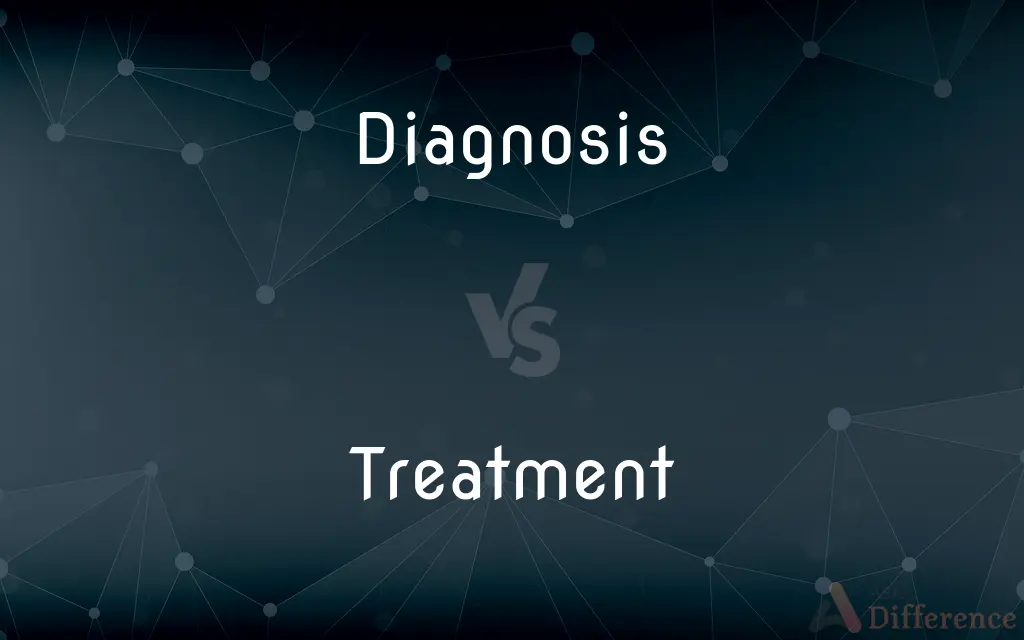Diagnosis vs. Treatment — What's the Difference?
By Tayyaba Rehman & Urooj Arif — Updated on April 25, 2024
Diagnosis involves identifying a disease based on symptoms, whereas treatment is the method of managing or curing the disease.

Difference Between Diagnosis and Treatment
Table of Contents
ADVERTISEMENT
Key Differences
Diagnosis is the process of determining a disease or condition from its signs and symptoms, using tools like medical history, physical examinations, and diagnostic tests. Whereas treatment refers to the strategies implemented to manage or resolve the condition identified through diagnosis, including medications, surgery, and lifestyle changes.
In diagnosis, accuracy is crucial as it directs the treatment plan; a misdiagnosis can lead to ineffective or harmful treatments. On the other hand, treatment focuses on efficacy and safety, aiming to alleviate symptoms, cure the disease, or improve the quality of life of the patient.
Diagnosis often requires the expertise of specialists trained to interpret symptoms and test results, such as radiologists or pathologists. Whereas treatment can be administered by a range of healthcare providers, including physicians, nurses, and therapists, depending on the nature of the illness.
The tools and methods used in diagnosis vary widely, from simple physical assessments to complex imaging technologies like MRI and CT scans. In contrast, treatment methods can include pharmacological interventions, surgical procedures, physical therapies, and psychological counseling.
Diagnosis is typically a preliminary step in the healthcare process, intended to be as objective as possible to ascertain the cause of health issues. Treatment, however, is a response to diagnosis and is often tailored to individual patient needs, preferences, and medical histories.
ADVERTISEMENT
Comparison Chart
Purpose
Identifies the disease or condition
Manages or cures the disease
Methods
Medical history, tests, physical examination
Medication, surgery, therapy
Professionals Involved
Specialists like radiologists, pathologists
Physicians, surgeons, therapists
Focus
Accuracy in identifying the problem
Efficacy and safety in managing the problem
Outcome
Conclusion about the health issue
Improvement or resolution of health issues
Compare with Definitions
Diagnosis
Conclusion reached from diagnostic tests.
The MRI led to the diagnosis of a spinal disc herniation.
Treatment
Any method used to alleviate symptoms.
Treatment options may include lifestyle changes.
Diagnosis
A process in medical practice.
Early diagnosis improves the effectiveness of treatment.
Treatment
Intervention to improve a patient’s condition.
Surgical treatment was necessary to repair the injury.
Diagnosis
The act of analyzing health information.
Diagnosis requires careful consideration of patient history.
Treatment
Implementation of medical advice.
The treatment prescribed by her doctor was immediately effective.
Diagnosis
Medical judgment about a condition.
His diagnosis was challenging due to the overlapping symptoms.
Treatment
Actions taken to relieve or heal a disorder.
Long-term treatment will ensure better management of the condition.
Diagnosis
Diagnosis is the identification of the nature and cause of a certain phenomenon. Diagnosis is used in many different disciplines, with variations in the use of logic, analytics, and experience, to determine "cause and effect".
Treatment
The management or cure of a disease.
The treatment for the infection involved antibiotics.
Diagnosis
The act or process of identifying or determining the nature and cause of a disease or injury through evaluation of patient history, examination, and review of laboratory data.
Treatment
The act, manner, or method of handling or dealing with someone or something
"the right to equal treatment in the criminal and juvenile justice system" (Susan C. Ross).
Diagnosis
The opinion derived from such an evaluation.
Treatment
(Informal) The usual methods of dealing with a given situation
Gave the opposing team the treatment.
Diagnosis
A critical analysis of the nature of something.
Treatment
The use of an agent, procedure, or regimen, such as a drug, surgery, or exercise, in an attempt to cure or mitigate a disease, condition, or injury.
Diagnosis
The conclusion reached by such analysis.
Treatment
The agent, procedure, or regimen so used.
Diagnosis
(Biology) A brief description of the distinguishing characteristics of an organism, as for taxonomic classification.
Treatment
A written sketch outlining the plot, characters, and action for a screenplay but not including certain elements of a finished screenplay, such as camera directions and dialogue.
Diagnosis
(medicine) The identification of the nature and cause of an illness.
Treatment
An adaptation of a novel or other literary work that serves as the basis for a screenplay.
Diagnosis
The identification of the nature and cause of something (of any nature).
Treatment
The process or manner of treating someone or something.
He still has nightmares resulting from the treatment he received from his captors.
Diagnosis
(taxonomy) A written description of a species or other taxon serving to distinguish that species from all others; especially a description written and published in Latin.
Treatment
The use of a substance or process to preserve or give particular properties to something.
Diagnosis
Synonym of diagnose
Treatment
(countable) A treatise; a formal written description or characterization of a subject.
Diagnosis
The art or act of recognizing the presence of disease from its signs or symptoms, and deciding as to its character; also, the decision arrived at.
Treatment
A brief, third-person, present-tense summary of a proposed film.
Diagnosis
Hence, the act or process of identifying the nature or cause of some phenomenon, especially the abnormal behavior of an animal or artifactual device; as, diagnosis of a vibration in an automobile; diagnosis of the failure of a sales campaign; diagnosis of a computer malfunction.
Treatment
(obsolete) entertainment; treat
Diagnosis
Scientific determination of any kind; the concise description of characterization of a species.
Treatment
The act or manner of treating; management; manipulation; handling; usage; as, unkind treatment; medical treatment.
Diagnosis
Critical perception or scrutiny; judgment based on such scrutiny; esp., perception of, or judgment concerning, motives and character.
The quick eye for effects, the clear diagnosis of men's minds, and the love of epigram.
My diagnosis of his character proved correct.
Treatment
Entertainment; treat.
Accept such treatment as a swain affords.
Diagnosis
Identifying the nature or cause of some phenomenon
Treatment
Care by procedures or applications that are intended to relieve illness or injury
Treatment
The management of someone or something;
The handling of prisoners
The treatment of water sewage
The right to equal treatment in the criminal justice system
Treatment
A manner of dealing with something artistically;
His treatment of space borrows from Italian architecture
Treatment
An extended communication (often interactive) dealing with some particular topic;
The book contains an excellent discussion of modal logic
His treatment of the race question is badly biased
Common Curiosities
How does treatment differ from diagnosis?
Treatment involves managing or curing the disease identified through diagnosis, focusing on patient care and recovery.
What is the main goal of diagnosis?
The main goal of diagnosis is to accurately identify a disease or condition based on symptoms and tests.
What are the risks of incorrect diagnosis?
Incorrect diagnosis can lead to inappropriate treatments, worsening of the condition, or unnecessary procedures.
What are some common tools used in diagnosis?
Tools commonly used in diagnosis include medical histories, blood tests, imaging studies like X-rays and MRIs.
Can treatment occur without a diagnosis?
Generally, treatment is based on a diagnosis, but some symptomatic treatments can occur without a definitive diagnosis, especially in emergencies.
How has technology impacted diagnosis and treatment?
Technological advancements have greatly improved the accuracy of diagnoses and the effectiveness of treatments, such as through improved imaging and minimally invasive techniques.
What role do healthcare professionals play in treatment?
Healthcare professionals, including doctors, nurses, and therapists, implement and monitor treatment plans tailored to patient needs.
Why is accurate diagnosis important in healthcare?
Accurate diagnosis is crucial as it guides the appropriate treatment plan and prevents the risks associated with misdiagnosis.
Are there cases where diagnosis and treatment happen simultaneously?
Yes, in acute or emergency cases, diagnosis and treatment can be concurrent to rapidly manage severe conditions.
How do treatments vary across different diseases?
Treatments vary significantly and are specific to the disease type, severity, and patient health status, ranging from medications to surgeries.
What is the difference between chronic treatment and acute treatment?
Chronic treatment is ongoing and aimed at managing long-term conditions, whereas acute treatment addresses immediate and urgent health issues.
Share Your Discovery

Previous Comparison
Burette vs. Pipette
Next Comparison
Narrowband vs. BroadbandAuthor Spotlight
Written by
Tayyaba RehmanTayyaba Rehman is a distinguished writer, currently serving as a primary contributor to askdifference.com. As a researcher in semantics and etymology, Tayyaba's passion for the complexity of languages and their distinctions has found a perfect home on the platform. Tayyaba delves into the intricacies of language, distinguishing between commonly confused words and phrases, thereby providing clarity for readers worldwide.
Co-written by
Urooj ArifUrooj is a skilled content writer at Ask Difference, known for her exceptional ability to simplify complex topics into engaging and informative content. With a passion for research and a flair for clear, concise writing, she consistently delivers articles that resonate with our diverse audience.
















































